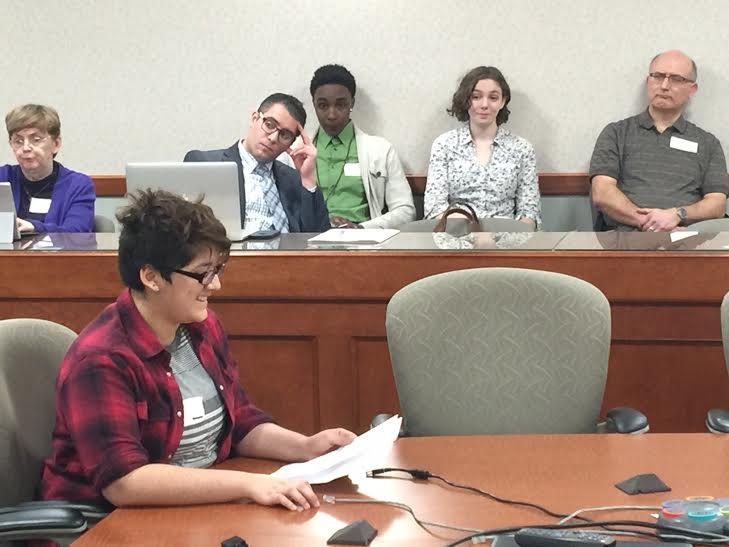
Silence.
That’s what I heard from my mother as I painted a cardboard sign that I would hang around my chest at school that day. She said nothing during my early-morning scramble to finish the sign, which had in bold red letters statistics about the plight of LGBTQ youth. She didn’t even really look at me.
It was 2010 and I was a 12-year-old outcast. I was queer, nestled uncomfortably within a tight-knit conservative Michigan town. My first GLSEN Day of Silence really shouldn’t have been much different than every other day — I was used to the anxiety of a mouth clenched shut. I spent most of my time hiding in the bathroom.
But that day was different. It was at two o’clock that morning that I came out to my mother. She hadn’t reacted well; I wanted to scream. I didn’t.
As I handed out speaking cards to whoever harassed me about not volunteering in class, word began to spread through the school of what I was doing. A boy named Trent followed me to my band class screaming that he hated gay people and wanted to kill them all, all while laughing.
(The next day I mentioned this to my history teacher. She laughed and said she was surprised I let him get to me.)
But other people began to engage with me for a different reason — they wanted to take the oath of silence, too. After an impressive pantomime campaign, we made copies of my speaking cards, and by the end of the day, six or seven people had joined in, to varying degrees of success. Sometimes they spoke because they had to, or snickered about something at lunch. But, quickly, they would shut up again. They were devoted.
When I saw them purse their lips in silence, I saw myself. They were telling the world about me, without even saying a word.
When the ending bell rang that day and I took a breath and spoke, finally, it was the first time that I felt that my small voice was a sacred one.
Silence itself is not power. In fact, it is the very lack of power in having no voice that makes GLSEN’s Day of Silence significant.
When we gather together and sanctify a day in the name of vulnerable silence, we bless the voice with a significance beyond measure. Yes, LGBTQ youth often don’t have a choice of whether or not to be silent, but on GLSEN’s Day of Silence, we recognize this. We hold a memorial for all the words unsaid. We mourn the suppression of LGBTQ voices. Silence is ours — and when we show that silence is a tool of oppression, we reject the idea that it is normal, it is acceptable, for us to be shut up by our environments. We claim our voices, and we reclaim our silence.
This year will mark my sixth Day of Silence. In some ways I am still that nervous queer kid I was in 2010 — every year, I still struggle to maintain composure throughout the day. I still need lots of support.
But in recognizing the importance of my voice on that day in April so many years ago, I forever altered my future. I unapologetically broke the silence again and again — no matter how far away I was pushed from the general public, I would not be quiet.
I was queer, and I would not be crushed by my own shame anymore. I would not apologize for my honesty. I would fight with every teacher who told me not to write about queerness in class. I would argue with every substitute teacher who dead-named me. I would become an activist. I would speak to teachers and students about the necessity of supporting LGBTQ kids. I would become the president of my GSA. I would talk. I would talk, and talk, and talk, until the sensation of a cotton-ball dry mouth felt like success.
Silence.
 That’s what I heard from my mother recently as I detailed my action plan for the next few weeks. I had to give public comment to the Michigan school board about transgender student policies (pictured left). I had to organize the sign-up for the GLSEN Day of Silence at my school and get together the Day of Silence “Survival Pack” goody bags I had promised. I had an interview with a radio station coming up soon. She was looking at me with her eyebrows knitted together.
That’s what I heard from my mother recently as I detailed my action plan for the next few weeks. I had to give public comment to the Michigan school board about transgender student policies (pictured left). I had to organize the sign-up for the GLSEN Day of Silence at my school and get together the Day of Silence “Survival Pack” goody bags I had promised. I had an interview with a radio station coming up soon. She was looking at me with her eyebrows knitted together.
She spoke.
“I am… so proud of you, you know that?”
It hits me that this time, when I am speechless, someone will take notice.
Aiden Ramirez-Tatum is a member of GLSEN’s National Student Council.
Photo Credit Kate Wells/Michigan Radio

